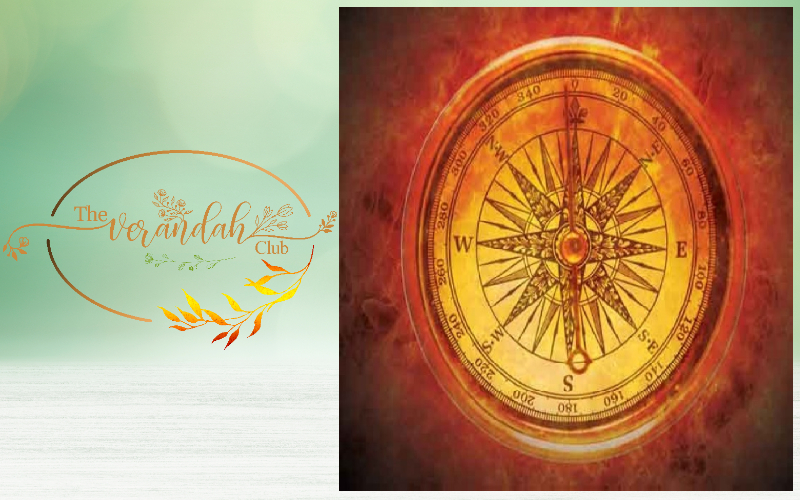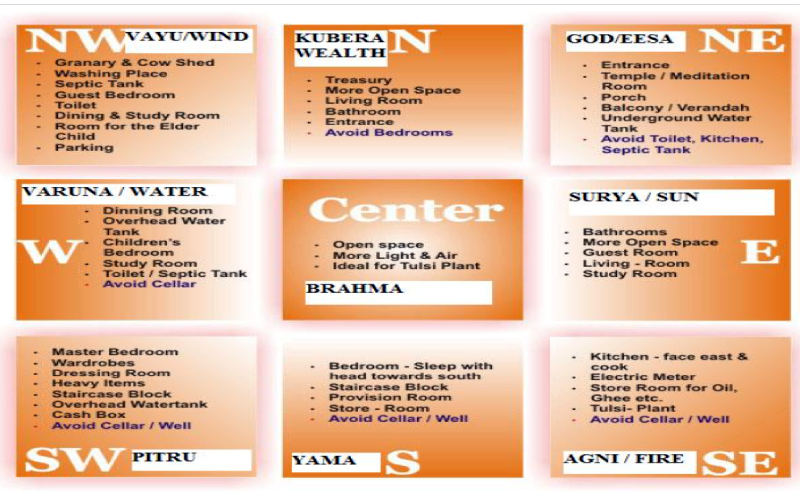Importance of Cardinal directions

According to Vastu Shastra, the entire Universe exists in an endless space and there is no direction whatsoever. However, on Earth our directions are defined with respect to the Sun. There are eight Cardinal directions -
1. East (Purva): The Sun rises in this direction.
2. West (Paschim): The Sun sets in West.
3. North (Uttara): The direction in the left, if we are facing East.
4. South (Dakshin): The direction in the right, if we are facing the East.
The corner where two cardinal directions meet also has a great significance in Vastu Shastra, as it combines the forces emanating from both the directions.
5. North-East (Eeshanya): Intersection of North and East directions.
6. North-West (Vaayavya): Intersection of North and West directions.
7. South-West (Nairuthya): Intersection of South and West directions.
8. South-East (Aagneya): Intersection of South and East directions.
Since Vastu Shastra is based on scientifically proven facts, it is worthwhile to understand these factors and their negative and positive effects on human beings.
Earlier in our articles we have understood the importance of the magnetic energies and the Sun’s rays on us. Since these directions are defined with respect to the Sun, hence it is believed that the right disposition of the rooms of the house with respect to the eight cardinal directions has a direct positive influence on the residents.
The main aim here is to ensure that the inmates of a house are inadvertently exposed to the useful rays of the sunlight, even if they are inside the house the whole day. During a day people perform various activities in different rooms at different times and Sun’s position keeps changing with respect to the cardinal directions. Therefore, to ensure that the inmates get exposed to sunlight constantly, each room should be positioned in a specific cardinal direction, so that it faces the sun at the time when it is most likely to be used by them.

Let us now understand what should be the ideal layout of the house with respect to these directions. Vastu assigns symbolic Gods, having certain inherent qualities, to each of the eight cardinal directions and centre. Like for instance the kitchen, where the main activity is cooking, is positioned in the South-East direction and Agni, the God of fire is assigned this direction.
If we divide the zones of the house or workplace (by placing the compass in the centre), we can easily calculate, which room is in which direction/zone. While doing so we should consider the sub directions as well like North-East, South-West, North-West and South-East. Each direction, because of their elements, is suitable for certain activities and unsuitable for some.
If the zones are not tended to proper directions and the right activity is not allocated to the right zone while designing the space, we feel the negative effects of the imbalanced energies in our lives. Hence it is important to understand what each direction should be used for to create an environment of harmony and prosperity.
We will discuss the eight Cardinal Directions, the symbolic Gods that are believed to rule them and the preferred rooms to be designed, as per Vastu. Since Vastu is a science, as an Architect, I believe that all the guidelines are based on logic and reasoning. I will try to explain these guidelines scientifically and rationally, so that my readers can decide on their own what they want to follow.

1. East (Purva): Being ruled by Sun, the life-giving force, it is a perfect zone to have the entrance here. The morning sun light brings with it a lot of good health and healing properties. That is why it is crucial to have windows, doors, balconies and gardens in this direction. The ideal rooms or areas suitable in this direction are entrance, living room, drawing room, family lounge, bath areas etc.
Logical Reasoning – The rising sun is in the east, between 6:00 am – 7:30 am. Since the rising sun represents the essence of all the beginnings, this is the best place to have the entrance door, as a reverence to the Sun. In the earlier times, the toilets and bath areas were not designed together. So, some Vastu Pandits also believe that the bath areas can also be placed in this direction as the morning sunrays are full of energy and UV rays and kills harmful germs. They also help in the formation of Vitamin D.

2. West (Paschim): Governed by the Water God, Varuna: This zone gives strength. It is a good zone to have office of senior and mid-level employees. Also, a good location as a study/bedroom for students who are in higher classes and professional courses. This also a great zone for sports people and can also be used for setting up a gym. This zone can be used for dining space as well. The staff quarters and overhead water tanks can also be placed in the West.
Logical Reasoning –The setting sun is in the West, between 3:00 pm - 6:00 pm. Since this is the ideal time for the children to study, the children’s bedroom and the study room can be placed in this zone. The West is the direction which gets heated up more than the other directions. This is due to the hot after noon sun and the re-reflection of the infra-red rays from the ground. Therefore, less used areas like toilets, storerooms can be located here. They will serve as a buffer and prevent the rest of the areas of the house from getting heated up. They will also remain dry and hygienic due to the heat from the west.

I am an Architect, Interior Designer and a Vastu Consultant, with more than a decade of experience in conceptualization, designing and construction of diverse architectural projects. An alumnus of IIT-Roorkee, I have a thorough background in architecture and interior designing with expertise in directing all project phases. My passion towards architecture inspires me to keep learning about various new trends yet following the age old traditions.
NEXT ARTICLE